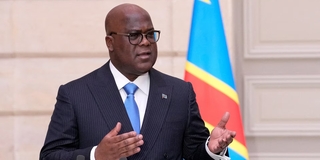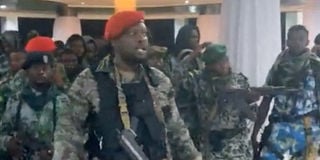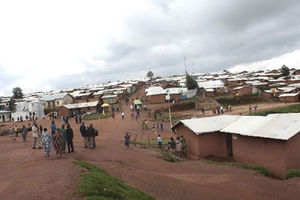
Congo's President Felix Tshisekedi speaks during a press conference with French President Emmanuel Macron at the Elysee Palace in Paris, France on April 30, 2024.
A week after the failed coup d'état in Kinshasa, many questions are being raised but answers are not forthcoming. Congolese authorities have simply said that investigations are ongoing.
Peter Kazadi, Deputy Prime Minister in charge of the Interior and Security ministry, said the coup plotters who “attacked Vital Kamerhe’s residence and the presidential palace came from Angola to enter Kongo Central with the help of accomplices in the DRC”.
Kongo Central is the province where the capital Kinshasa is situated. Kamerhe is President Felix Tshisekedi’s ally and the incident happened ahead of polls in which he was elected Speaker of the National Assembly.
Accusing Angolan nationals may be damaging. Nothing from Kinshasa has, by going to press this week, indicated the relations between the DRC and neighbouring Angola has been ruined.
Angola is important because it has been trying to broker peace between DRC and Rwanda over the conflict in eastern DRC. Luanda is widely seen as a neutral arbiter.
But Angola isn’t the only country whose nationals have been accused. In the wake of Sunday’s events, footage emerged of people said to be Americans. Security agents displayed what looked like passports confiscated from those arrested.
Lucy Tamlyn, the US Ambassador to Kinshasa, condemned the incident and offered to work with Congolese authorities to nail any culprits.
“I am shocked by the events of this morning and very concerned by reports of American citizens allegedly involved,” she said.
“Please be assured that we will cooperate with the DRC authorities to the fullest extent as they investigate these criminal acts and hold accountable any US citizen involved in criminal acts.”
The US State Department followed by placing a call to President Tshisekedi.
Secretary of State Antony Blinken, too, condemned the attack on the presidential palace and offered US support for investigations, besides efforts to alleviate suffering in eastern Congo.
Kinshasa has not stated whether it would be open to that offer. But officials seem to mistrust most outsiders. Americans have not particularly been welcome lately, as Kinshasa pursues what it calls ‘conflict minerals’, accusing some American firms of profiting from the war in the DRC.
How the DRC’s relations with the US and other foreign entities move from here may largely depend on what President Tshisekedi says next, in the aftermath of the coup attempt.
Some Americans paraded after the arrests have been identified as businessmen.
They used ‘rudimentary’ rifles, targeting one of the most guarded places in Kinshasa: the national palace where the President resides. They were led by Christian Malanga, who involved his 21-year-old son Marcel Malanga, an American citizen, in the operation. His mother, Britney Sawyer, who remains in the United States, said her son “is just an innocent, manipulated by his father”.

A man in military fatigues speaks as others stand next to him inside the Palace of the Nation during an attempted coup in Kinshasa, Democratic Republic of Congo, May 19, 2024 in this screen grab from a social media video.
Christian Malanga was killed as he tried to flee after failing to reach the presidential palace. Four of his men were killed and others arrested.
Born in Kinshasa, he trained in the United States of America. He then returned to the DRC and joined the army in the early 2000s. Several sources claim that he held the rank of captain. But his family had settled in the United States.
In the videos released after the incident, he spoke English, uttered expletives and also spoke Lingala whose accent was not local. They waved Zaire flags, attaching their ideology to the old Congolese name and insignia.
Since 2011, Malanga has been involved in politics, attempting to run in the 2011 legislative elections. He also founded the United Congolese Party in the US.
On May 17, 2017, he formed a “government in exile” and announced that the New Zaire had been born.
Since then, he has been stepping up his weapons training. After years of no visible action, Malanga reappeared on May 19 in the attempted coup. He said he wanted to “oust the scam in power and restore Zaire”.
According to the Congolese army’s account, at around 4am on Sunday, Malanga and his small group of armed men headed for the home of the new prime minister, Judith Suminwa.
That’s when things started to go wrong for them. The putschists failed to locate the exact address and retreated to the villa of the Defence Minister, Jean-Pierre Bemba. Unable to find him at home, the group attacked the residence of Kamerhe. They tried to kill him, but Kamerhe had managed to hide.
Why did they target Kamerhe? At the time of the events, Kamerhe was just MP, the majority party's sole candidate for the post of National Assembly Speaker. He was elected to the post on Wednesday.
“How is Vital Kamerhe a target that would affect the institutions of the Republic more than President Tshisekedi?” posed Nicaise Kibel, an expert on military issues in the DRC.
“Why rush to an empty presidential office on a Sunday morning, knowing that the Head of State would not be there, and without making sure to go to strategic sites?” the local press also weighed in.
Litsani Choukran, a human rights activist, added: “How do you explain that people who rob a citizen, steal his car and kill him are going to carry out a coup d'état? They were going to commit an assassination. It’s as simple as that.”








